Ahead of the International Week of Deaf People 2021 – which takes place from Monday 20th September – Bradford Cathedral’s Creation 3 / Peace Sunday service on the 19th September was signed by Anna Smith.
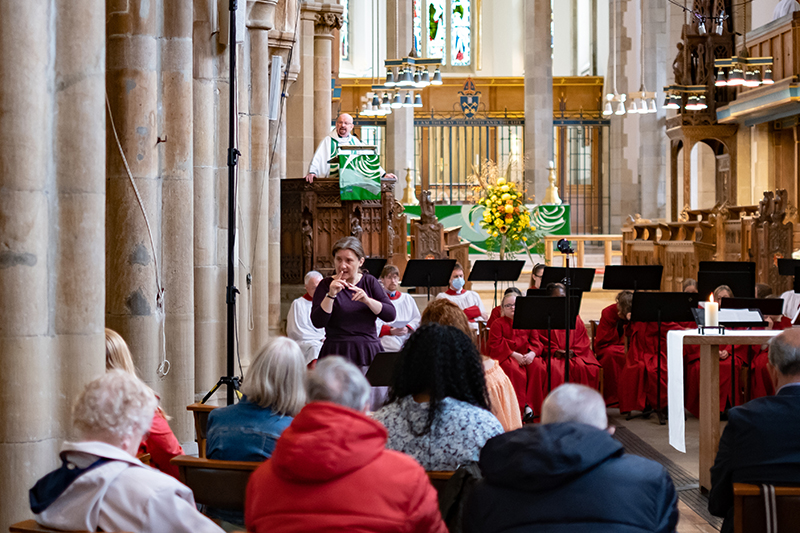
Her husband, the Rev Mark Smith – Vicar of Rawdon – was the guest preacher at the service, and his sermon was all about his work with deaf people, recalling the experiences of deaf Christians, and looking at what can be done to help make going to church – as a deaf Christian – more accessible.
But often deaf people’s gifts haven’t been recognized. One of the joys that I’ve had in my ministry is to enable deaf people to use the gifts that God has given them.
The Revd Mark Smith
You can catch up on Revd Mark’s sermon – fully signed by his wife Anna – on our YouTube channel, and subtitles also available (see below) You can also hear it on Soundcloud and read it in full further down this blog post.
The ‘Just A Minute’ after worship group was also signed by Anna.
We hope to work with Revd Mark, Anna and the Deaf Church for future services. Please look out for further information soon, and if you have any ideas to help make future services or events please e-mail us.
To find out more about the International Week of Deaf People 2021 please visit the World Federation of the Deaf website.
Revd Mark’s sermon
May I speak in the name of the Father, and the Son, and the Holy Spirit, to the glory of God the father. Amen.
Do you ever feel sometimes tempted to add a few words to the end of a Bible reading? I do today! I want to add to Jesus’ words ‘blessed are the deaf’, ‘blessed are the deaf people’, those beautiful people who he’s called me to work among, who have a beautiful language, that perhaps you can see being signed at the front of the church right now.
A gift to His church.
But, I didn’t always see it so.
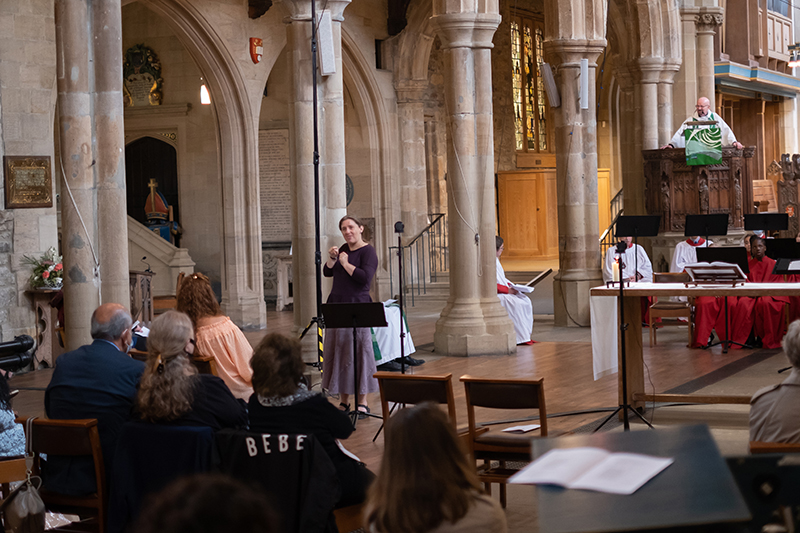
Many years ago, I used to be a regular visitor to Bradford Cathedral, in the late 80s and early 90s. I came here to sometimes speak, sometimes to lead workshops, to do all sorts of things, and it was a place I enjoyed visiting, but at that stage I wouldn’t have been able to tell you what I’m telling you today. Because I knew nothing about deaf people, their community, their needs. I’d managed to go through my whole life without really encountering that particular, beautiful people group.
I’d been ordained by that stage around about 20 years before something happened that changed me. Now, some of you heard me speak before might have heard my story about how I first encountered deaf people in a church setting. You may have heard me recount how some of the older people told me about their experiences in school, when they were not allowed to sign; they weren’t allowed to use sign language. They learnt it from their friends, they learnt it behind the bike sheds as it were, but they weren’t actually allowed to use it in a school setting. Some of them told me how they’d had their hands tied behind their backs so that they would learn to “speak better”.
And other’s told me about their experience of if they were caught signing under the desk, the ruler would come out and there’d be a slap on the back of the hands. I guess most of us would see that as abusive these days. But that’s what they’d grown up with. But, somehow, still miraculously, they’d preserved their language, and they continued as a very tight and very strong community.
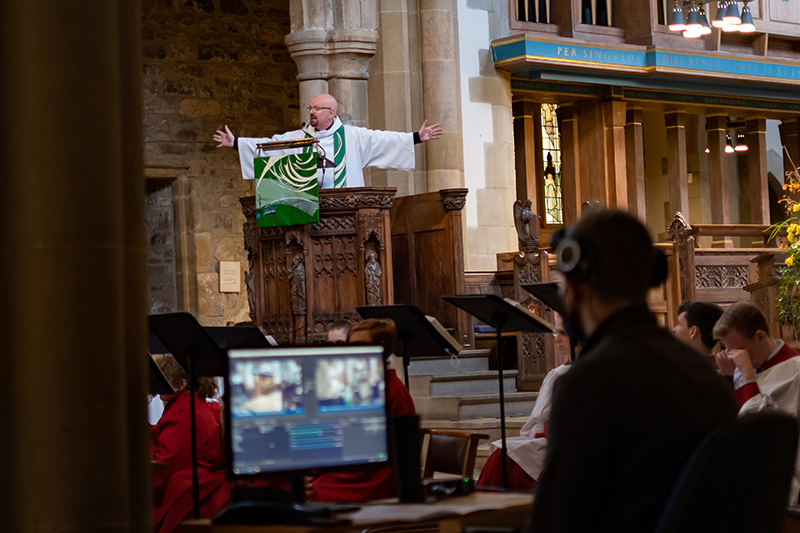
At the end of that particular set of meetings, where I encountered the deaf people – at that stage I couldn’t sign – I was having things interpreted to me by a sign language interpreter, what I said to the deaf people was being interpreted – but at the end I prayed for all the deaf people. I prayed for one deaf man that God would speak through him like a prophet. I shouldn’t have even tried because he then turned around to me and says “God says he wants you to work amongst us and he’s going to give you the gift of our language” and I thought “yeah, right, as if”.
Little did I know! A little while later I was at another church conference. I was at the end of my tether spiritually and, I don’t normally have stories like, this but I’m going to tell you I saw Jesus. He walked towards me. He didn’t speak to me he signed to me. In British Sign Language he quoted the Bible towards me. He signed “my peace I give to you” – not as the world gives – “give I to you” – “my peace I give you”. And something hit me deep inside.
The first thing was, how on earth did I understand that? I had no idea. Maybe I’d picked up a few signs mixing with the deaf people, but I like to think it was God’s spirit at work.
And then the picture I saw of Jesus changed, and instead of signing to me, he had his hands nailed to a cross – typical crucifixion scene like we’d see – and he couldn’t sign because his hands were nailed firm, and my mind went back to the stories, that those deaf people told me, about having their hands tied and not being allowed to sign. And I’m filling up now as I recount it to you, but that was my reaction at the time.
Still, I wasn’t quite called, but I did, following that experience, feel it was important that I went and joined a sign language class. So, I began at level one learning basic signs – hello, how are you, what did you have for dinner today – and all that stuff, and began to learn.
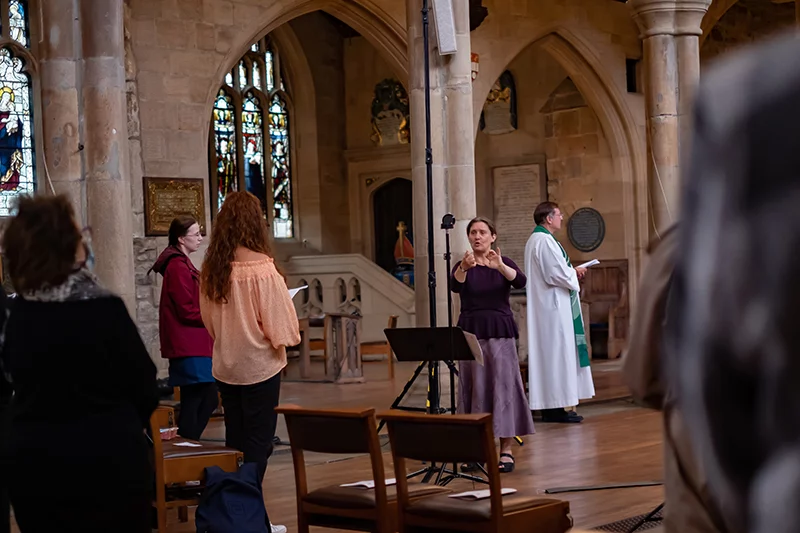
It wasn’t easy always – quite hard to pick up at times. Sometimes people think it’s easy to learn sign language or people who become deaf can find it in a few minutes – it isn’t, it’s another language, it’s like learning French or German.
But, in that place where I saw Jesus, I found him anew, and he found me anew, and so I began to meet deaf people, to learn of their struggles and joys. A lot of them told me, because they were Christian deaf people some of them, they told me about their experiences of coming to church, and it was amazing that so many of the deaf Christians had the same story: “when I was young I was brought up, maybe I went to church, I went there with school, I went there with me mum and dad, but I couldn’t hear anything anybody was saying. Most of it went over my head. I didn’t understand. I couldn’t follow it, and then people didn’t seem to want to mix with me, and even those people who were quite good at lip reading would say to me – you know – they didn’t face me, they turned away, and perhaps some of the people were a little bit embarrassed: you know a little bit like when somebody comes in and they’ve gone through a recent bereavement and we don’t quite what to say, so we think we’ll play it safe and just stay apart, but you know how that comes over don’t you? It comes over as cold and unfriendly, and church isn’t a place for me.”
So, those deaf people withdrew, and then the story so often is the same: somebody found me and they took me to a church where the vicar printed off his sermons and gave them to me, so I could follow, or they took me to a church where somebody sat next to me and wrote highlighted notes to help me find my way along, or I went to a church and there was a sign language interpreter there and I could follow it! Or even I went to a deaf church and everybody there signed and, wow, I was completely involved in everything!
So, that’s my work now, and that’s what I’m encouraging our church to do: to include deaf people that way. But including deaf people isn’t just making sure they can access what we’re doing. Deaf people are incredibly gifted people. They’re like us really. If you’ve got full hearing, some of us are really clever, some of us aren’t. Same goes for deaf people. Some of us are really outgoing, some of us aren’t – we’re quite shy. Same goes for deaf people.
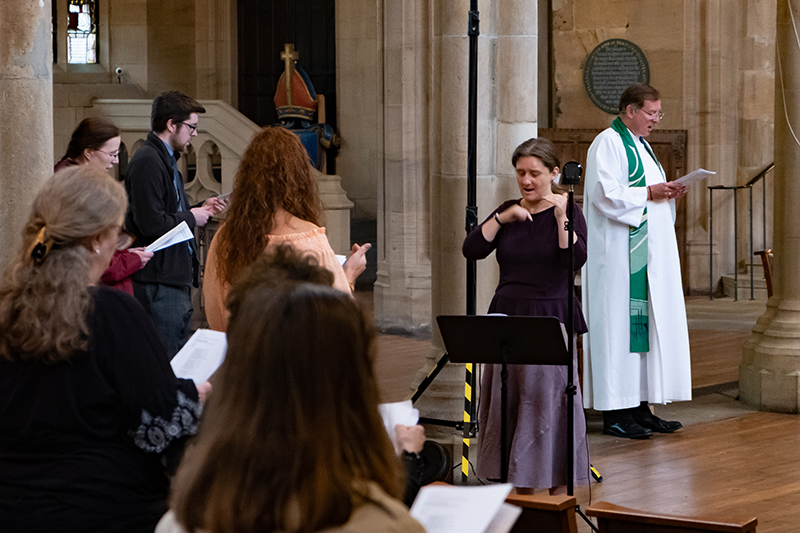
But often deaf people’s gifts haven’t been recognized. One of the joys that I’ve had in my ministry is to enable deaf people to use the gifts that God has given them.
For eleven years, I worked as chaplain for deaf people in the Diocese of Derby before I came to Leeds Diocese, and during that time one of my greatest joys was helping a young deaf man who was full sign language – he didn’t really speak very much, or do a lot of English: he could read, but didn’t communicate orally – to find the call to ordination, to go through the selection process, to find his way, eventually, through training with the aid of some other people and sign language interpreters, and now he’s leading the deaf church in Salisbury Diocese. Because his gifts were released, and again and again it’s wonderful to see deaf people learning to express themselves in song, in the gifts that they’ve got: some are pastors, some are teachers, some are all the gifts we have in our wider church, and one of the other greatest joys I had was, through some of the Christian conferences, seeing deaf leaders, deaf teachers being able not just to attend, but sometimes to speak, with sign language interpreters not doing what Anna’s doing now, signing with their hands, but watching and speaking out what they see, so that we can all benefit from their ministries.
In one sense it’s a bit of a fraud me standing here today because really it should be a deaf person signing, and you should be listening to an interpretation of them, but I’m the best you’ve got for today so I hope you can put up with that!
And yet deaf people have done this with tremendous disadvantage sometimes. Think about the Bible. If I go to my house, there’s Bibles in every language on my shelves. I’ve got bibles in Hebrew, in Greek, in French, Italian, German and umpteen others. The shelves have practically fall down because of them! I’ve even got somewhere are gospels in Scouse and the gospels in Geordie hidden away in a corner! I haven’t got a Yorkshire one yet – anybody got one? – but I’ve got those things.
But you know what? There’s one bible I haven’t got. I haven’t got a bible in British Sign Language.
Over in America they’ve only just got their first Bible in American Sign Language. In Britain we’ve got a project translating the Bible into British Sign Languages. We’ve got one book of the Bible now; Mark’s gospel has now been translated. But what a shame isn’t it, when in my English ministry, amongst the English speakers of this country, I’ve got a range of a whole range of translations: colloquial, scholarly, literal, figurative: I can choose whatever I want. But when it comes to the deaf work, if I don’t translate it myself most of the time, there isn’t something. So, these projects are important, and if anybody wants to talk to my wife Anna, she’s very involved with the translation to translate the Bible into British Sign Languages. And she organizes deaf focus groups that look at the translations that have been produced by deaf translators and by bible scholars together to start to get us a real translation of the Bible. Not what Anna did in the readings, when she made it up at the moment, but a proper scholarly thoughtful translation like we’ve got of our English Bibles.
So, there we are many people many deaf people have only heard half the good news.
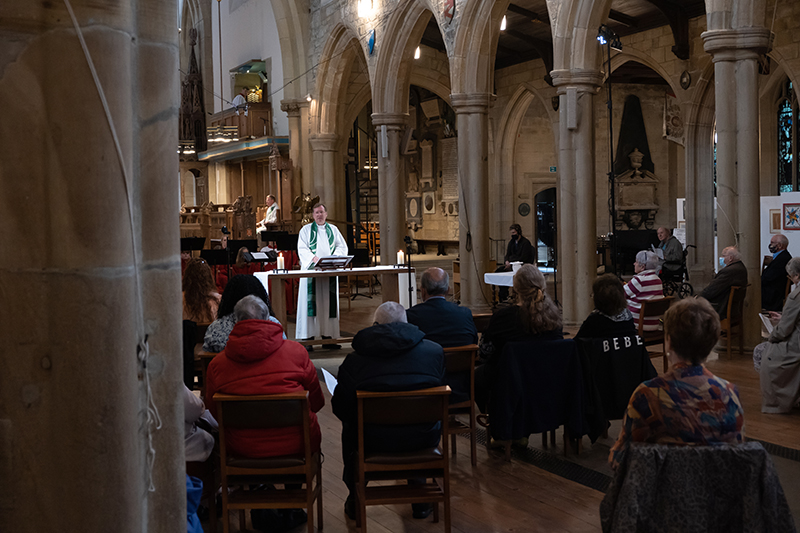
When I first started to encounter deaf people, burnt on my memory as an encounter that I had with a young girl. I only had I think level two sign language at that stage, I was only just getting started, and a local priest asked me to come over to his church, because he had a young deaf girl in his congregation who was going to be confirmed, and he didn’t know how to prepare her for confirmation. So, I went and sat with her, and I scratched my head and thought “what can I do?” I’m a bit raw and green at this thing, so I found a film of the life of Jesus, from the last supper through to the crucifixion and resurrection – the passion story – and it had subtitles, so we watched it together with the subtitles on, and then we took a break, and I just recounted the story again in sign language, and we talked about it.
And so, we went through the communion – yes she’d seen the bread and the wine in church she knew that – we came to the story of the crucifixion, and she’d seen that, and then we came to the story of the resurrection, and she looked at me. Her mouth dropped open and she said to me: “how did that happen? I never heard about that before!” This girl had been going to church with her family her whole life, but because she was deaf, she was taken out with the younger ones and helped with the children, and perhaps she’d been taught in school about the Easter story, but maybe that was the time when the teacher turned their back, and she couldn’t lip read anything. So, she missed it. I’ll tell you – I was deeply moved at her reaction, because when she realized that was what the Bible story ended, she went “wow that’s amazing” and she had all the excitement of somebody hearing the resurrection story for the first time.
I’ll tell you that’s a privilege to be involved with. Isn’t that wonderful?
And we can be a part of it today. We might not have sign language, but I guess every single one of us can sometimes take the time to get close to people who are deaf, who come into our churches. I guess every single one of us can maybe sit next to somebody and maybe write the key notes of what’s said in a sermon and share them with us. I guess we can remember to be patient, so if we don’t quite understand someone’s voice, we can wait and hang around them a little bit more until it begins to make sense to us, or if we feel that they’re not understanding us, we might not get impatient but just rephrase things, and maybe move ourselves into better light, or make sure we’re facing them more clearly, or add some gestures to what we say. All those things can help, all those things can help you to join what is in fact a very, very beautiful community. There’s a lovely group of deaf Christians in our Diocese, and may God bless you, and maybe – if you take time to communicate with a deaf person – like me, you might well find God is speaking to you in ways that you did not expect. Amen.
